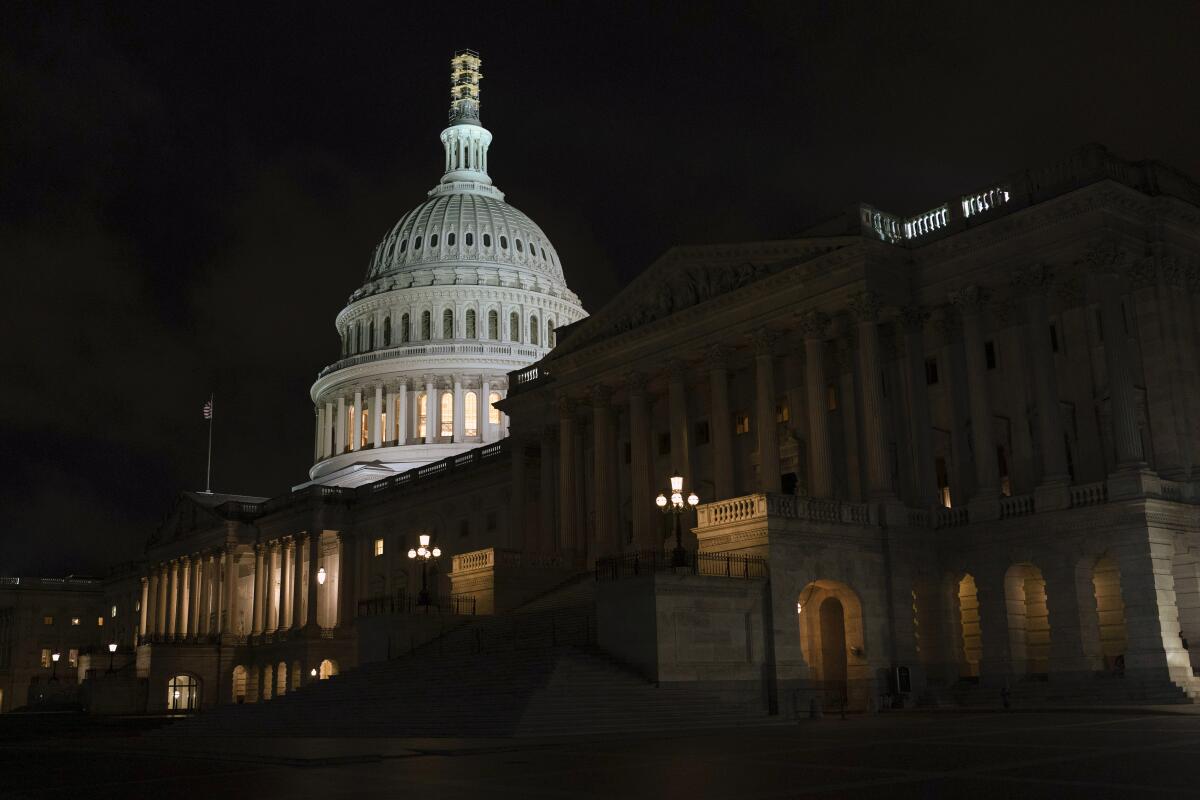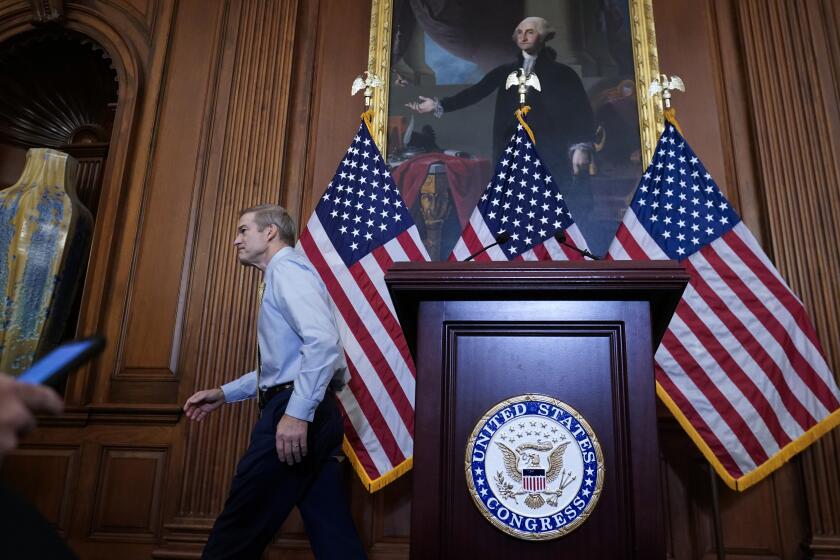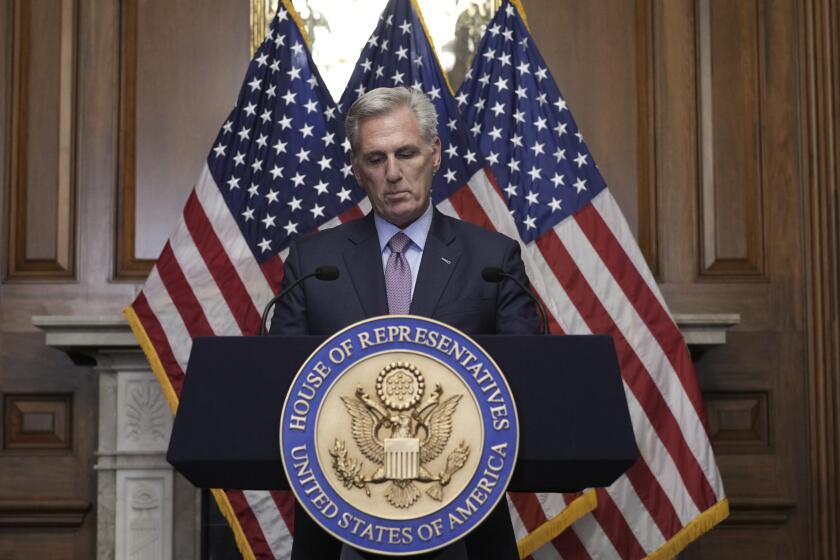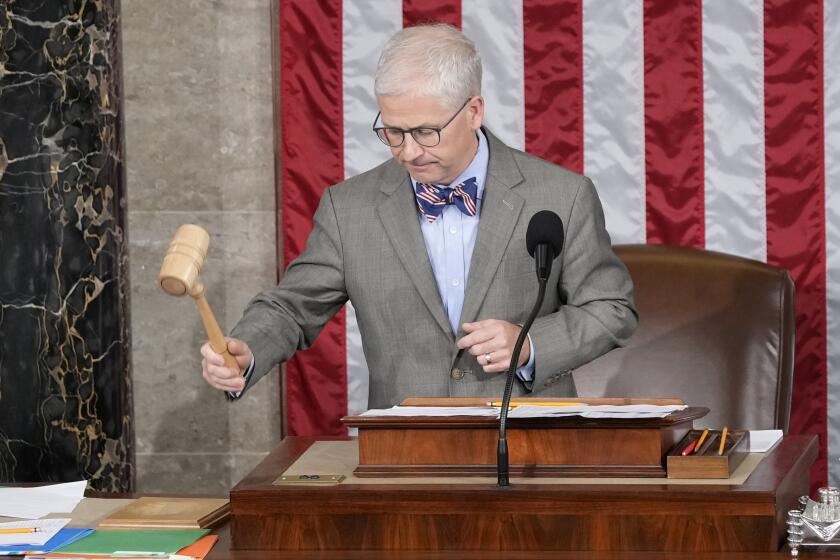Editorial: The GOP is broken, and the nation is paying the price in House speaker turmoil

The repeated failure of House Republicans to elect a speaker to succeed the defenestrated Kevin McCarthy is more than a political tragicomedy; it’s a threat to the national interest at a time of turmoil in Ukraine and the Middle East and another looming deadline for avoiding a government shutdown.
After three weeks of jockeying and insider drama, Republicans meeting behind closed doors on Tuesday nominated their third post-McCarthy candidate for speaker, House Majority Whip Tom Emmer of Minnesota. But Emmer dropped out of the running just hours later, perhaps because he realized it was unlikely he could be elected on the floor with only Republican votes. After his nomination, several right-wing Republicans indicated that they wouldn’t vote for him on the floor, and former President Trump chimed in with a social media post disparaging Emmer as a RINO — a “Republican in name only.”
Will the House GOP learn from the last week? Speakers are supposed to be traffic cops, not ideological firebrands.
Emmer would have been a better choice for the speakership than the conference’s last nominee, the volatile Trump ally Jim Jordan of Ohio. Unlike Jordan and 138 other House Republicans, Emmer did not vote to object to results of the 2020 presidential election (though he issued a statement that seemed to give credence to questions about its fairness). He also voted to suspend the debt ceiling to avoid a default and to keep the government running — sensible bipartisan measures that enraged some conservatives in the Republican conference.
Late Tuesday, Republicans tried again, nominating Rep. Mike Johnson (R-La.) with a floor vote expected on Wednesday.
The flimsy and fractious Republican majority in the House divides several ways — some observers, borrowing from the lingo of organized crime, refer to the factions as “the Five Families” — which is one reason unity on a replacement speaker has been elusive. If House Republicans can’t get it together to elect a speaker soon, it may be time for a bipartisan initiative to choose new leadership.
For the sake of their party and the country, Republicans in choosing a new House speaker should seek a conciliator, not a chaos agent.
House Democrats understandably declined to throw McCarthy a lifeline earlier this month, when Rep. Matt Gaetz (R-Fla.) successfully moved to “vacate the chair.” McCarthy, after all, had appeased the extremists in his conference, most notably by unilaterally announcing a baseless impeachment inquiry into President Biden. But House Minority Leader Hakeem Jeffries (D-N.Y.) has suggested that his party is open to a bipartisan solution to end the crisis over the vacant speaker’s chair.
Last week Jeffries said: “It’s time for traditional Republicans to get off the sidelines, get in the arena and realize that the chaos, dysfunction and extremism has to end. And the only way to do it is to figure out how we can partner in a bipartisan fashion to reopen the House and govern in a reasonable, common-sense way. It’s time for House Republicans to embrace bipartisanship and abandon extremism once and for all.”
The broken GOP has a majority in the House in name only. It’s giving frightening new meaning to the old saw about politicians’ forming a circular firing squad.
For all his failures of leadership, McCarthy was willing to find a way out of the debt-ceiling and shutdown crises. If some other potential McCarthy successor can’t secure the chair with only Republican votes, Jeffries should renew his offer of a bipartisan way out. But that would depend on responsible Republican members actually proposing such a path and being willing to take it.
The nation — and the Republican Party — would benefit from an end to this chaos. So far, it doesn’t appear the GOP is ready to start governing.
More to Read
A cure for the common opinion
Get thought-provoking perspectives with our weekly newsletter.
You may occasionally receive promotional content from the Los Angeles Times.













